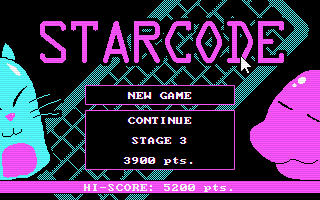Starcode
Coding game, © KesieV 2018

There is something I'm missing so much from the age of the first home computers and that's the BASIC editor at boot.
The two home computers of my heart and childhood that inspired the whole Wright! project - the Commodore 64 and ZX Spectrum - used to do that. Today's computers just show an empty desktop, a dashboard filled with apps to run or - in the worst cases - a blank screen waiting for you to put something to run in.
This change of course meant a lot for the entire computer industry, which decided to send to the users a totally new message: computers are not meant to be coded, they are meant to be used.
There is a saying that goes 'the best technology is the one you can't see' and removing the infamous and scary BASIC screen is the best coat of invisible paint you can choose for a computer. Computers still needs a program in order to work but you don't have to build one by yourself - this technology mostly works with programs made by others.
The computer suggests you to delegate to someone else the burden of coding. This delegation is for good: less time spent on understanding how to solve a problem with a computer is more time spent on solving the problem itself. But, as in everything good, bad things are always hiding in the shadow.
That choice promoted some kind of detachment between computer users and software makers: while in the early ages there was at least some rough idea about how to make software and the effort behind that, and the mandatory BASIC screen and the thick programming manual shipped with the computer worked as memento very well, now people are get used to pay for the hardware and not for software which can be very confusing.
I'm not talking about free operating systems or the controversial software piracy, which can lead to mixed opinions, but the perfectly legal free-to-play and ad-supported game market. People pays real money for ingame armors, potions and currency or earn them watching advertising. Real life money or money inducing activities has been disconnected from the product manifacturing, making software development even more intangible.
I'm not going to complain about these markets. I'm worried about how software development is perceived by non-developers due to these markets. In a capitalist society, in which the price of something is deeply linked to its value, this counterintuitive pricing may lead to wrong conclusions, in which coding is so boring obvious that's free.
Now coding is even taught in early schools and that's a nice way to mitigate the problem... but I think that facing the opportunity of coding every time you switched your personal computer on was the best way to suggest the effort, creativity and potential behind it.
Plot!
Starcat's job is collecting stars and this time you can help him coding! Drag and drop the program statements to the code bar, run the program and see Starcat following it! Will you be able to collect all of the stars with the few statements possible?
Drag and drop the statements using your pointer (touch screen or mouse). Drag a statement from the bottom bar to the program for adding it and drag the program statements away for removing them. You can change cycles counter hitting the block's + and - buttons. Press the play button on the bottom right for running the code when you're ready. Good luck!
(Want to share something? You can find me on Twitter!)
 Install / Add to home
Install / Add to home
 View game sources
...or play it online below!
View game sources
...or play it online below!